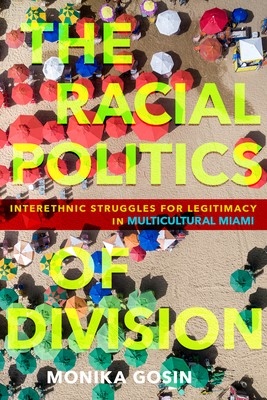
- Išsiųsime per 10–14 d.d.
- Autorius: Monika Gosin
- Leidėjas: Cornell University Press
- ISBN-10: 1501738240
- ISBN-13: 9781501738241
- Formatas: 15.2 x 22.9 x 1.6 cm, minkšti viršeliai
- Kalba: Anglų
- Extra -15 % nuolaida šiai knygai su kodu: ENG15
Atsiliepimai
Aprašymas
The Racial Politics of Division deconstructs antagonistic discourses that circulated in local Miami media between African Americans, "white" Cubans, and "black" Cubans during the 1980 Mariel Boatlift and the 1994 Balsero Crisis. Monika Gosin challenges exclusionary arguments pitting these groups against one another and depicts instead the nuanced ways in which identities have been constructed, negotiated, rejected, and reclaimed in the context of Miami's historical multiethnic tensions.
Focusing on ideas of "legitimacy," Gosin argues that dominant race-making ideologies of the white establishment regarding "worthy citizenship" and national belonging shape inter-minority conflict as groups negotiate their precarious positioning within the nation. Rejecting oversimplified and divisive racial politics, The Racial Politics of Division portrays the lived experiences of African Americans, white Cubans, and Afro-Cubans as disrupters in the binary frames of worth-citizenship narratives.
Foregrounding the oft-neglected voices of Afro-Cubans, Gosin posits new narratives regarding racial positioning and notions of solidarity in Miami. By looking back to interethnic conflict that foreshadowed current demographic and social trends, she provides us with lessons for current debates surrounding immigration, interethnic relations, and national belonging. Gosin also shows us that despite these new demographic realities, white racial power continues to reproduce itself by requiring complicity of racialized groups in exchange for a tenuous claim on US citizenship.
EXTRA 15 % nuolaida su kodu: ENG15
Akcija baigiasi už 5d.21:53:00
Nuolaidos kodas galioja perkant nuo 10 €. Nuolaidos nesumuojamos.

- Autorius: Monika Gosin
- Leidėjas: Cornell University Press
- ISBN-10: 1501738240
- ISBN-13: 9781501738241
- Formatas: 15.2 x 22.9 x 1.6 cm, minkšti viršeliai
- Kalba: Anglų
The Racial Politics of Division deconstructs antagonistic discourses that circulated in local Miami media between African Americans, "white" Cubans, and "black" Cubans during the 1980 Mariel Boatlift and the 1994 Balsero Crisis. Monika Gosin challenges exclusionary arguments pitting these groups against one another and depicts instead the nuanced ways in which identities have been constructed, negotiated, rejected, and reclaimed in the context of Miami's historical multiethnic tensions.
Focusing on ideas of "legitimacy," Gosin argues that dominant race-making ideologies of the white establishment regarding "worthy citizenship" and national belonging shape inter-minority conflict as groups negotiate their precarious positioning within the nation. Rejecting oversimplified and divisive racial politics, The Racial Politics of Division portrays the lived experiences of African Americans, white Cubans, and Afro-Cubans as disrupters in the binary frames of worth-citizenship narratives.
Foregrounding the oft-neglected voices of Afro-Cubans, Gosin posits new narratives regarding racial positioning and notions of solidarity in Miami. By looking back to interethnic conflict that foreshadowed current demographic and social trends, she provides us with lessons for current debates surrounding immigration, interethnic relations, and national belonging. Gosin also shows us that despite these new demographic realities, white racial power continues to reproduce itself by requiring complicity of racialized groups in exchange for a tenuous claim on US citizenship.




Atsiliepimai